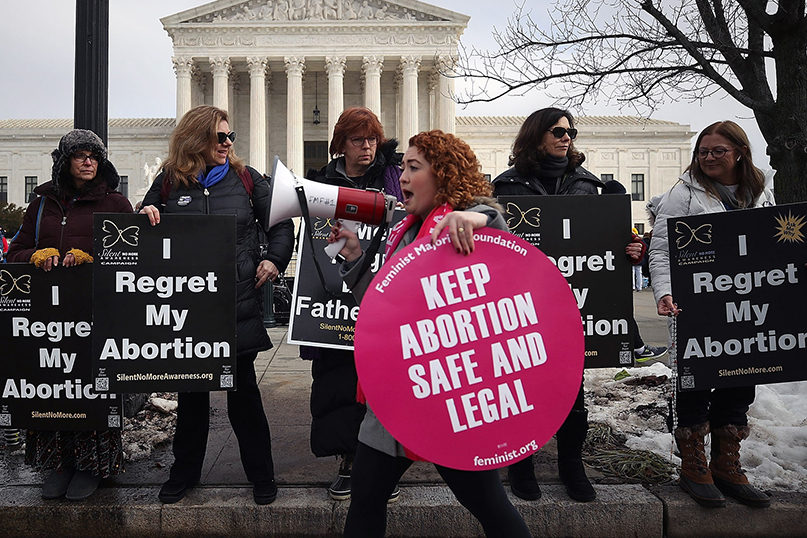
What Jewish law really says about abortion
By Ephraim Sherman
(JTA) – Alabama and Georgia have passed laws recently that limit or forbid abortions in unprecedented ways, joining a growing number of states that are attempting to dramatically restrict abortion access.
During these charged times, it is appropriate for the Jewish community to remind ourselves that halacha (Jewish law) has a nuanced view of abortion.
It seems that many in the Orthodox Jewish community have not been overly worried by these and other efforts to curtail legal abortion. Ben Shapiro, a conservative commentator who identifies as an Orthodox Jew, has long been a loud voice in favor of government-imposed restrictions on abortion. He has cheered the recent state level bans in print, on social media and in his podcasts. He argues that Judaism is in the “pro-life” political camp, as opposed to “pro-choice.”
But in America, the pro-life narrative is largely articulated by the Christian right, and there are important differences between how Judaism and Christianity view the span of time between conception and birth.
Earlier this year, New York state significantly eased its restrictions on abortions after 24 weeks (often called “late term abortion,” which carries ideological baggage and is preferred on the right). This makes it far more feasible for a woman to have a life-saving abortion, or an abortion of a genetically anomalous fetus, later in pregnancy. Importantly, the law does not allow for abortions after 24 weeks without a medical justification. Many of these abortions are fully in line with Jewish law but previously had been more legally questionable.
However, both the Rabbinical Council of America (RCA) and Agudath Israel, large organizations that represent Orthodox Jewish communities, condemned the decision because it allowed for “abortion on demand,” in the Orthodox Union’s (OU) words, before 24 weeks.
Agudath Israel wrote that it “opposes initiatives that would make abortion unlawful even in situations where termination of pregnancy is mandated by religious law … However, it is not necessary to make all abortions permissible in order to protect the rare instance when abortion is truly indicated.” The RCA said it supports “the part of the law that permits abortion, even at a late stage, when the mother’s life is at risk.”
“Late term” abortion is not a medical term, but rather the political designation used by abortion opponents for cases where the procedure is done after 24 weeks – the point in pregnancy when a generic fetus is potentially capable of life outside the womb (assuming available high-level neonatology care).
Once the fetus can survive outside the womb, the cases in which abortion are necessary to save the mother’s life drop dramatically. However, in the very rare and terrible scenarios where it is necessary, New York state has made it easier to have these abortion procedures.
There are at least two significant differences between Jewish law and Catholic law and the hard-line pro-life narrative when it comes to abortion:
Jewish law does not consider the fetus to be a being with a soul until it is born. It does not have personhood. Furthermore, before 40 days, some poskim, or deciders of Jewish law, have a low bar for allowing an abortion.
The Talmud, in Yevamos 69b, cites the view of Rav Hisda that “until forty days from conception the fetus is merely water. It is not yet considered a living being.”
If there is a threat to a woman’s life, the safety of the mother takes precedence over continuing the pregnancy at any stage.
Many sources illustrate this graphically and rather unambiguously, and all modern poskim agree on this. In fact, in certain circumstances, a fetus that endangers the life of the mother is legally considered a “murderer” in active pursuit.
For example, in a case of maternal danger, we find in Sanhedrin 72b (further clarified with Rashi’s commentary) that “a midwife may insert her hand into the womb and kill the fetus … [the reason is] for as long as the fetus has not emerged into the world, it is not a nefesh [a being with a soul]; one is therefore allowed to kill it and save the mother …”
According to Mishna Oholos 7:3, “If a woman is having trouble giving birth, they cut up the child in her womb and bring it forth limb by limb, because her life comes before the life of [the child].”
The murder of one person to save another person is strictly forbidden in Jewish law, even to save the first person’s life. But if an individual is trying to end someone’s life, killing that person is actually a requirement. How much more so, a fetus (not yet a full person) may be aborted.
In his Mishneh Torah, Maimonides writes the following: “The sages ruled that when complications arise and a pregnant woman cannot give birth, it is permitted to abort the fetus in her womb, whether with a knife or drugs, for the fetus is considered a rodef [a murderer in pursuit] of its mother … If the head of the fetus emerges, it should not be touched, because one life should not be sacrificed for another. Although the mother may die, this is the nature of the world.”
In other words, when a fetus endangers the life of the mother, unless it is in the process of being born, abortion is a halachic requirement.
Rabbi Moshe Feinstein, a revered modern posek with one of the most rigid modern positions on abortion, considers a fetus to have near-personhood status and abortion to be similar to murder in most cases. In his view, there must be clear evidence that the mother’s death is close to certain if an abortion is to be permitted (Igros Moshe, Choshen Mishpat II: 69B). But even Feinstein concurs that if a mother’s life is in danger, abortion is a halachic necessity.
Most other authorities, notably Rabbi Shlomo Zalman Aurbach and Eliezer Waldenberg, who are among the most trusted modern poskim for medical questions, require there to be reasonable risk but err on the side of caution for the mother’s life. These and other poskim recognize that in the words of Rabbi Aharon Meir Goldstein, “Jewish law does not afford a fetus full status as a person.”
As with all of Jewish law, rabbinical scholars wrestle with how to apply these directives in individual cases. Poskim (rabbis who are generally qualified to make halachic rulings) with expertise in this specific area keep abreast of updates in medical diagnostics and technology, and decide on a case-by-case basis which women should be encouraged to have an abortion and which should not be.
But critically, the new restrictive abortion laws do not allow a woman and her rabbi to reach that decision on her own.
In the Georgia law, abortion is strictly banned and criminalized after approximately six weeks. The law includes a provision that seems to allow for abortion in the case of imminent maternal danger.
But it states that before a legal abortion can proceed, a physician must determine “that a medical emergency exists.” Put in clinical terms, this means that a woman would need to be actively in danger at the time abortion began, along the lines of what Feinstein requires.
Jewish law takes psychological and emotional distress into consideration.
The Georgia law specifically states that psychological and emotional distress will not be deemed a danger to the mother, or as a factor contributing to the danger. This view is contrary to the beliefs of many Orthodox poskim.
Waldenberg, considered to be one of the foremost modern scholars of Jewish law in medicine, writes that severe psychological distress is as much of a legitimate reason for an abortion as severe physical distress (Tzitz Eliezer 13:102; 14:101).
He also writes in reference to abortions for fetuses that are physically or genetically ill, and are only likely to have a short and painful life:
“It is clear that in Jewish law an Israelite is not liable to capital punishment for feticide … An Israelite woman was permitted to undergo a therapeutic abortion, even though her life was not at stake … This permissive ruling applies even when there is no direct threat to the life of the mother, but merely a need to save her from great pain, which falls within the rubric of ‘great need.’ Now, is it possible to imagine a case in which there is more need, pain, and distress, than the present one, in which the mother is confronted by the [prospect of a] suffering child whose certain death is only a few years away and nothing can be done to save it?” (Responsa Tzitz Eliezer 13:102)
In Georgia and Alabama, even if a Jewish woman’s obstetrician and psychiatrist encouraged her to terminate a pregnancy due to her psychiatric state or the health status of the fetus, and even if her rabbi told her that Jewish law fully allows her to terminate, she would be forced by law to carry the baby. It would not matter what that means for her safety or the status of the fetus – nor that it violates her religious beliefs.
If a woman is diagnosed with cancer during her pregnancy and needs to receive chemotherapy and/or radiation in order to survive, abortion is often needed, and is halachically warranted, prior to these treatments. None of these state level bans seem to allow for this, as the mother is not inherently in a state of medical emergency. Would these states argue that chemotherapy and radiation could be given while she is pregnant, and the fetus may or may not survive this noxious assault? Or perhaps they would argue that these treatments cannot be given, as they might cause a spontaneous abortion? In other cases the law is explicit that intentionally triggering a spontaneous abortion would be grounds for prosecution of the mother and doctor.
Strict abortion laws impinge on the religious freedom of observant Jews.
The laws that multiple states are now passing, or attempting to pass, make clear that a physician who participates in an abortion will be vigorously prosecuted. In Georgia, it also criminalizes traveling outside of the state to have an abortion.
Abortions, especially later in pregnancy when many of the dangers that necessitate one become apparent, require expertise and practice to perform safely. It is no exaggeration to say that this law will make even legal abortions for clear maternal physical danger much more difficult to access in these states, as research shows that laws passed to limit abortion correlate with decreases in the number of facilities providing them.
Also, what physician wants to learn how to do a procedure that could land them in prison for decades if a court finds retroactively that the mother was not in enough danger to necessitate it? Or that the danger was not imminent enough?
A reasonable Jewish observer might worry that the loosening of laws that regulate abortion would lead to an increase in abortions for halachically unjustifiable scenarios. A woman who decides that she would rather be pregnant during fall instead of summer, or after a given life event or financial achievement, would not find rabbinic support for such an abortion. Perhaps, the observer wonders, it is better to have strict laws to prevent such abortions.
But as I have expanded upon above, it is nearly impossible to create a law that limits abortion and does not put a secular legal ban on some halachically permissible abortions.
What Jewish community would want to continue to live in a place where they are potentially barred from following halacha? Is a community even allowed by halacha to continue living in such a place, if they have the option of leaving?
It appears to me that the Jewish community cannot justify staying on the sidelines of this national American issue. We need to take the side of allowing for safe, legal, available abortions. Jewish law does not align with the Christian right on this issue, and neither should Orthodox Jews.
Ephraim Sherman, DNP, RN, AGPCNP-BC, is a nurse practitioner and healthcare researcher, focused on the intersection of culture and healthcare.
The views and opinions expressed in this article are those of the author and do not necessarily reflect the views of JTA or its parent company, 70 Faces Media.
In Judaism, abortion is not a right – and pregnancy is a responsibility
By Rabbi Avi Shafran
N
EW YORK (JTA) – As in all life matters, when it comes to abortion, Judaism doesn’t speak of rights but of responsibilities and obligations. Seeing things through that lens can be a real eye opener.
The concept of “rights” is deeply ingrained in our Western minds. We rarely stop to question it. But the idea, as wonderful as it is and as helpful as it has been to humanity, doesn’t coexist very cozily with a fundamental Jewish truth: Everything benefiting us isn’t due us, but is rather a gift that we are charged to use responsibly in the service of something higher than ourselves.
We have no legal or moral claim on financial success, happy marriages, health or good fortune – no “right” to any of those things – in Jewish law or in the Bill of Rights.
In addition to having no right to such things, Judaism also teaches that we have a fundamental obligation to act responsibly toward others.
While the much-invoked aphorism “the right to swing my fist ends where the other man’s nose begins” may well reflect the American legal approach, Judaism sees the assailant who doesn’t stop at a nose not as having violated the nose owner’s rights, per se, but as having incurred a responsibility – an obligation to pay for the damage, pain, medical bills, missed work and embarrassment that the fist owner has wrought. It’s a subtle but important distinction.
Which brings us to Jewish religious law’s stance on abortion. As in many areas of halacha, it is complex: There are a variety of approaches, situations and opinions. A good overview of the halacha of abortion was written recently for JTA by nurse practitioner Ephraim Sherman. [Sherman’s overview is included in this spread.] But a compendium of sources and applications cannot touch the core issue, the one that should be a game changer for Jewish-minded Jews: responsibility.
Abortion, in Jewish law, is not a right. In the vast majority of cases it’s actually a wrong. But even in cases where it is permitted or required, as when a Jewish mother’s life is endangered, even indirectly (or, although the matter is hardly free of controversy, according to some respected rabbinic opinions when the pregnancy seriously jeopardizes the mother’s health), the decision to terminate a pregnancy is not a question of a woman’s right to choose but of her responsibility to choose correctly, her obligation to do what halacha counsels in her particular case, whatever that may be.
And so, from a Jewish perspective, all the constitutional, judicial and philosophical issues whacked back and forth across the tennis court of public discourse are beside the main point.
It’s not the stage of pregnancy that ultimately matters and not the “status of a fetus.” Not “ensoulment” and not the specter of looming back-alley abortionists. What counts alone in Judaism is the responsibility to do what Jewish law requires in any particular case.
Most reasonable people on both sides of the perennial abortion debate would like abortion to be rare. Currently, although the abortion rate in the U.S. has dropped somewhat in recent years, it is very far from uncommon. The predominant reasons for seeking an abortion, according to a 2013 U.S. National Library of Medicine-National Institutes of Health survey, have been financial (40 percent), timing (36 percent), partner-related reasons (31 percent) and the need to focus on other children (29 percent).
From a “rights” perspective, all such justifications are perfectly acceptable. From a “responsibility” perspective, though, not so much. In fact, not at all. Halacha considers a potential life to trump most other concerns.
There is, of course, no reason why Jewish theology should be embodied in American jurisprudence. But Judaism’s stance happens to reflect the feelings of a majority of Americans. A 2018 Gallup survey found that only 29 percent of respondents believed abortion should be legal in all circumstances.
Blanket bans on abortion, to be sure, would deprive Jewish women of the ability to act responsibly in cases where abortion is halachically required. And so, what Orthodox groups like Agudath Israel of America, for which I work, have long promoted is the regulation of abortion through laws that generally prohibit the unjustifiable killing of fetuses while protecting the right to abortion in exceptional cases.
In the end, while abortion in Judaism’s eyes may not be a matter of “rights,” it is indeed a matter of “choice,” a word much invoked in the abortion debate and central to all aspects of human life.
Not “choice” in the sense of “all choices are equal,” but rather in the sense conveyed by the word as it is used in Deuteronomy.
“I have placed before you,” God informs us through Moses, “life and death, the blessing and the curse.”
“Choose life,” the verse continues, “so that you and your offspring will live.”
Rabbi Avi Shafran writes widely in Jewish media and serves as Agudath Israel of America’s director of public affairs.
CAP: Protesters on both sides of the abortion issue gather in front of the U.S. Supreme Court building during the Right To Life March, on Jan. 18, 2019 in Washington, DC. Credit: Mark Wilson/Getty Images







 Southern New England Jewish Ledger
Southern New England Jewish Ledger















